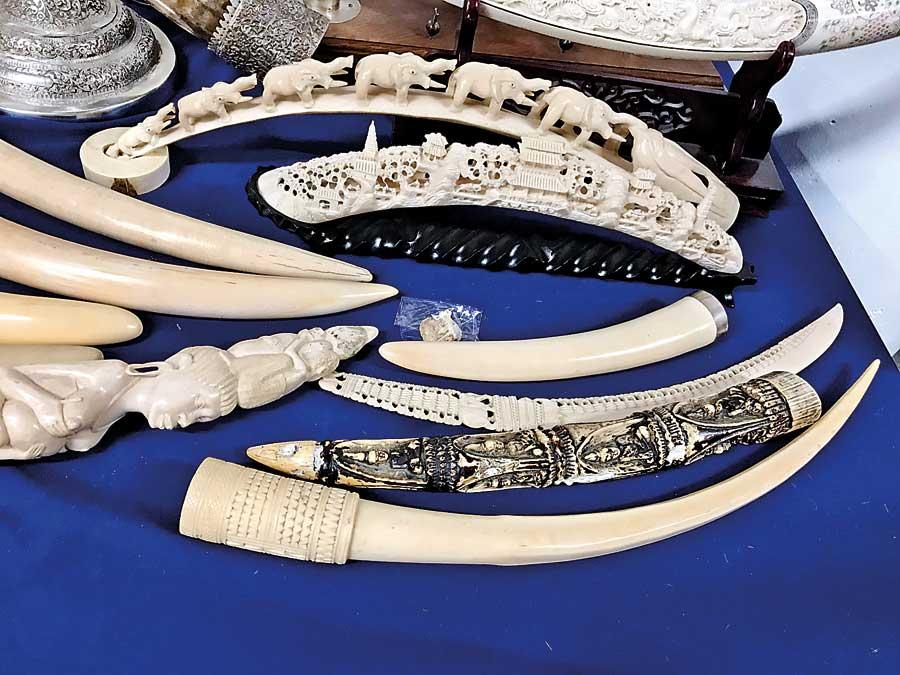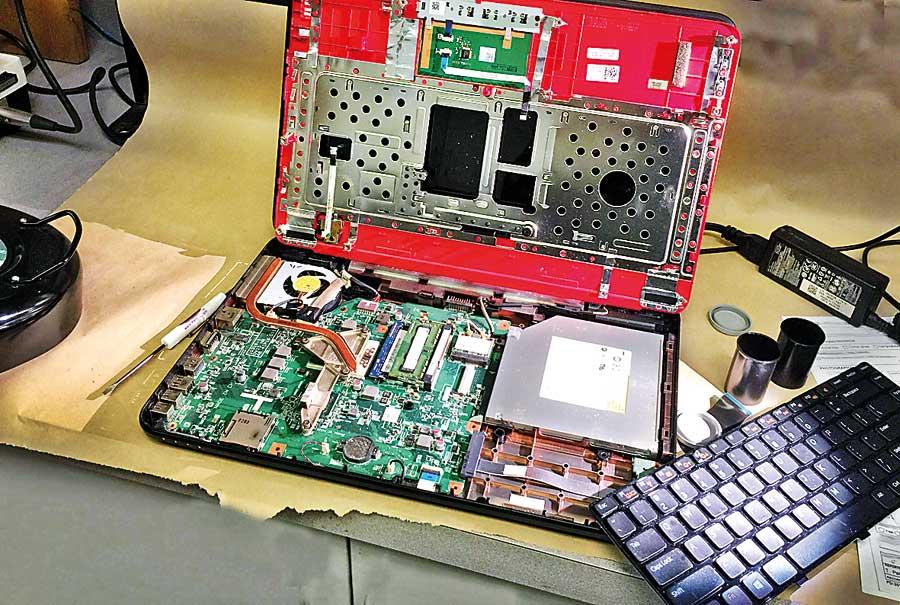24 Aug 2020 - {{hitsCtrl.values.hits}}

Ivory seized in London
- Three DWC personnel are electronic investigators
- Funding is the biggest hurdle
Wildlife crimes in Sri Lanka and around the world are escalating at an alarming pace. Illegal activities such as snaring pose a threat to endemic species and the link to the illegal bushmeat trade has in most instances been exposed. This is why US-based Serendipity Wildlife Foundation headed by Ravi Perera is dedicated to apprehend wildlife criminals with their expertise in tackling wildlife crimes. Although based overseas, the Foundation has trained local rangers and Wildlife Conservation Department (DWC)  officials to make use of advanced methods such as DNA fingerprinting and electronic forensics to bring perpetrators to justice. The Foundation has expanded with a digital forensics arm along with a wildlife intelligence unit known as the Tactical Universal Surveillance Knowledge-base System (TUSKS) and continues to extend their support to
officials to make use of advanced methods such as DNA fingerprinting and electronic forensics to bring perpetrators to justice. The Foundation has expanded with a digital forensics arm along with a wildlife intelligence unit known as the Tactical Universal Surveillance Knowledge-base System (TUSKS) and continues to extend their support to
Sri Lanka.
In an exclusive interview with the DailyMirror, Perera elaborated on how electronic forensics helps to apprehend wildlife criminals, the technology that is being used and certain roadblocks they have to face.
Excerpts :
 Q What is digital forensics at Serendipity Wildlife Foundation?
Q What is digital forensics at Serendipity Wildlife Foundation?
The Digital Forensics division at Serendipity Wildlife foundation is divided into three sections: Intelligence, Fingerprints, and Electronic Forensics. Each has its own task, and very often when investigating wildlife crime, each section supports each other.
Q How does electronic forensics help get hold of wildlife criminals?
Very often, those involved in wildlife crime have mobile phones on them, and there is evidence stored in the phone that contains photographs of animals, photographs of the crime, GPS information, incoming and outgoing phone numbers, and much more. Information is also stored in the suspect’s computer, camera, and even in drones. This information can be retrieved with special software that is used and restricted to law enforcement personnel, and used as evidence.
|
Ravi Perera |
Q Has this technology been introduced to Sri Lanka to fight wildlife crime?
Three personnel from the Department of Wildlife Conservation were trained earlier this year in electronic forensics and investigations. The personnel passed their basic exam, and our Foundation now refers to them as Electronic Investigators. We had plans of setting up an electronic workstation at the DWC head office where all electronic evidence can be investigated, but due to Covid-19 we have had to postpone it until the end of the year. Once the electronic workstation is set up in Colombo, Electronic Investigators will be able to handle their investigation of devices involved in wildlife crime in a restricted area according to international electronic evidence protocol. If needed, our Foundation also has electronic forensic experts internationally who are able to volunteer their time to assist local investigators by accessing the suspect’s device remotely, with specialized forensic software located half way around the world analyze the local evidence.
The Department of Wildlife Conservation is the first wildlife department in Asia to have an Electronic Workstation totally dedicated to wildlife crimes, and our Foundation is happy to assist them and support them in training and investigations.
Q Has Serendipity Wildlife Foundation trained any other countries in electronic forensics?
We have had requests from other departments in Asia and Africa, and we will be training two more agencies and assisting them to set up forensic workstations to fight wildlife crime, by 2021.
Q Can you tell us about the wildlife intelligence work your organisation does?
Our Wildlife intelligence division is called TUSKS (Tactical Universal Surveillance Knowledge-base System).
We conducted a study on poaching, wildlife trafficking, illegal sale of live animals, and the illegal sale of bushmeat and finally decided to start our own intelligence unit. One of the major factors that convinced us to go forward was that sometimes there was little, and most times no information exchanged between certain countries regarding wildlife crime. For example, someone would be caught in a country A for a wildlife crime, and the neighboring country B would have no idea that the criminal was also in their country, and possibly doing the same crime. If information is fed into our database, we will alert other organisations and share information.
Currently, we have five Investigative Analysts from five different countries that are undergoing training by law enforcement Training Officers in investigative and surveillance techniques. They have several investigative resources available to them, and our Foundation also has hi-tech devices that we will share with agencies that partner with us.
Q Tell us about the resources you are equipped with and partners.
|
Electronic investigators at training |
For the TUSKS intelligence programme we have a company based in Europe that consists of former British SAS (Special Air Services) officers that are well experienced in electronic warfare and intelligence gathering that will work with us on complex cases. They have access to immense resources and years of experience in working in Africa and the Middle East.
Another organisation that handles wildlife crimes worldwide has given us access to their database, and this has come in very useful to investigate internationally.
An organisation in India has also agreed to work with us in exchange of information on wildlife crimes and the availability of OSINT (Open Source Intelligence) experts when needed.
We partner with an organisation in the Netherlands who have provided us an app where our volunteers on the ground can gather information on poaching and selling of bush meat. The information collected can help in defining target areas of high poaching, information on the purchasers of illegal bushmeat, and even eating places that sell the poached meat.
Q How do you receive information on wildlife crime?
In Sri Lanka, mostly through named and anonymous sources. Sometimes, a person who has been scammed or tricked while conducting an illegal wildlife transaction will provide information about the seller.
Our Investigative Analysts will confirm that it is a legitimate crime, conduct the initial investigation, and forward their report to the law enforcement agency in that jurisdiction to handle.
Q Your organisation trained DWC personnel in crime scene investigation and fingerprints. What happened after that?
Twenty-one personnel went through the basic CSI Academy conducted by us. That was followed up with the second phase where the same personnel were trained in DNA collection and fingerprint collection. All of them passed and received certification, which enables them in conducting crime scene investigation. Unfortunately, we entered the COVID crisis and everything
|
A ‘Bear Claw trap that was seized, often used to trap an animals leg. Its very painful for the animal and it dies while left trapped for a few days |
was put on hold for field work. We hope to conduct a refresher course for them once COVID is over, and hope that their skills will be put to good use by the DWC.
Q What is the biggest hurdle or roadblock?
Funding to keep TUSKS running. Electronics, software, hardware, and license fees require money. We have had software companies that specialize in law enforcement software make donations in kind, and that has kept us going. Individuals have also donated money towards license fees that have to be paid annually. With the COVID crisis, the grants we were supposed to get were put on hold, and this has hurt us a lot.
Q How can people report wildlife crimes to you?
They can e-mail us at [email protected] or go to our website at www.CSIwildlife.org and click on the button on our home page.
*Jane from Australia is in her mid twenties. She has a Masters Degree in Environmental Science. “I decided to become an investigative analyst because I wanted to be able to contribute to solving and stopping wildlife crimes. I feel strongly about the illegal wildlife trade and if I can make a small difference that would be amazing. I am currently still training, but have been assisting in some cases. During training I saw a case where a young tiger cub was being transported in a suitcase. The tiger had been drugged to keep it still. This was quite disturbing that an innocent, naive animal would be treated like this. It was so sad and I cannot believe that this happens in the world. I am also currently assisting on a case where a European wants to import a lion and leopard cubs. Training is very intense, and our instructors have been investigators in the law enforcement. I am currently in my second month of training. You are taught to think like the criminal whenever you investigate. The primary question is “If I had to do this crime, how would I do it?” We have some great investigative tools that assist us, and it is amazing how one lead follows another.”
*name withheld on conditions of anonymity

A suspect’s laptop being investigated
26 Dec 2024 24 minute ago
26 Dec 2024 46 minute ago
26 Dec 2024 3 hours ago
26 Dec 2024 4 hours ago
26 Dec 2024 6 hours ago